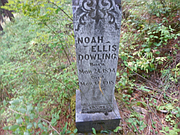PVT Dowling remembered (or Mis-remembered)
This year’s Veterans Day — Sunday, Nov. 11 — will fall on the 100th anniversary of World War I’s end, which happened at the 11th hour of the 11th day of November, 1918. It’s an important centennial. In early October there will be a brief but appropriate commemorative ceremony in Wallace at the War Mothers Plaque on the green of the Wallace Carnegie Library. The event is part of this year’s Fall For History program, scheduled for Oct. 4-7. Ed Vang and Mike Feiler, both of the FFH’s organizing committee, are orchestrating the WWI element, which will begin outside the library, by the flagpole, at 11 a.m. on Saturday, October 6th and will run for about 45 minutes.
Not unrelated, I’ve been looking at the names on the War Mothers Plaque a little more closely recently. The bronze plaque, which is lodged in a great stone, lists the names of 44 fallen Shoshone County WWI warriors. The initial plan for the tablet (as reported in a Wallace Press Times article published on Sept. 20, 1919) was to honor 32 local boys “who made the supreme sacrifice for their country.” By a year later, however, the list had grown to 36. And by the plaque’s final unveiling the following year the list had grown again to its final 44 names.
The War Mothers group appears to have been mindful that faulty information and internecine conflict might arise around the question of which names should, and which names should not, be included on the plaque. The group appointed an historian, Mrs. Mary E. Stone, for settling such conflicts and keeping track of relevant records and documentation. Mrs. Stone was the wife of local Wallace physician Caleb Smith Stone, Sr.
Yet — and inevitably — errors did creep in. Mind you, the group also appears to have made some shrewd decisions that kept some errors out! But the occasional mistake was perhaps inevitable in the confused rush of post-War circumstances in our county.
In this connection, one of the tablet’s names leaped out at me when I first saw it: “NORAH E. DOWLING.” Norah? Really? Had one of Shoshone County’s heroes been a woman? — say, perhaps, a nurse who’d died from influenza while caring for the soldiers suffering from it? Or was this perhaps the name of a foreign-born soldier (there were many in World War I’s American military), for whom our standard gender differentiations in names did not necessarily apply?
Well, a little digging threw some light on the matter. A “Noah Ellis Dowling,” of Spokane, registered for the draft in that city on June 5, 1917. He listed his occupation as an unemployed miner, which calling was doubtless the source of his connection to Shoshone County and his avenue to inclusion on the plaque. Dowling was 23 years old, said his card, and had been born in Arkansas.
And so, our tablet’s “Norah” was almost certainly a misspelling of “Noah.”
But the mystery surrounding soldier Noah Dowling didn’t stop there. His gravestone, at Nine Mile Cemetery, shows he died on May 12, 1918. But online WWI military sources I consulted yielded nothing about where he served or how he died.
Only a single fugitive source came to light in my various online searches. The Topeka Daily State Journal of May 16, 1918, contained a brief item titled “KANSAN IS DROWNED.” Its subtitle added, “Private Dowling of Lawrence Loses Life in New Jersey.” The sad news had come from, said the article’s dateline, the town of Lakewood in NJ, where Noah Dowling “…of Lawrence, Kan., a private attached to the medical corps at the base hospital here, was drowned while canoeing on Lake Carasaljo.”
The newspaper’s identification of Dowling as a Kansan and formerly of Lawrence suggests of course that he was not “our” Noah Dowling. Yet, the combined coincidences of the victim’s name and the likely date of death (the article was datelined May 14; Dowling’s gravestone, May 12) strike me as just too improbable for this Dowling not to be “our” Dowling. Military reports in 1918 were by no means free of errors. Perhaps, for instance, “Arkansas,” where “our” Dowling had been born, was mistakenly rendered as “Kansas” in the Army’s report of his death. I don’t know.
All manner of risks lay in wait for the young men who left our part of the country to serve in World War I. More soldiers, for example, perished from the great influenza epidemic than from combat. PVT Dowling’s service and sacrifice — with the misspelling of his name on our memorial tablet and the misidentification of his hometown in a Kansas newspaper — appears to have been particularly prone to recording errors. All of which, of course, diminishes in no way the honor he was paid by the War Mothers group by being included in the names listed on Shoshone County’s World War I commemorative monument.



